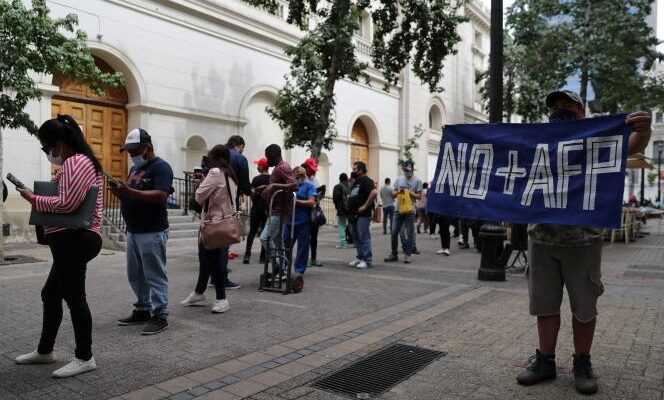It was in the heart of the southern winter, in July 2020. Endless queues stretched out at dawn in front of financial institutions: Chileans flocked to claim part of their retirement savings, after a decision history of Parliament giving the green light to the withdrawal of 10% of all pension funds, individually and privately funded. In the midst of a social and health emergency, as soon as it was approved by the Chamber of Deputies, concerts of casseroles in the windows had celebrated the measure, in Santiago in particular.
“Without the withdrawals, it would have been complicated to get out of it last year”, admits José Antonio, 36, a social worker from Santiagois who has accumulated precarious contracts that the Covid-19 pandemic and repeated confinements for much of 2020 have left jobless. A second withdrawal of 10% was then authorized, in December 2020. Then a third, in April 2021. Measures voted even by the parliamentarians of the presidential majority, while the president, Sebastian Piñera (right), was initially opposed to them .
A fourth authorization, 10% again, is currently being debated in Parliament and these repeated punctures call into question the sustainability of this pension system set up during the Pinochet dictatorship, under the influence of the Chicago Boys (a group of Chilean economists of the 1970s, influenced by Milton Friedman), who were testing their neoliberal theories.
Meager nest egg
The immediate consequences for the economy of these measures remain mixed. Firmly opposed to the fourth withdrawal, Sebastian Piñera announced, Tuesday, September 7, a bill to revalue the lowest pensions. In total, around 11 million people – almost all affiliates to the system – have withdrawn the equivalent of nearly 49 billion dollars (around 41.5 billion euros), in this country of 19 million inhabitants, according to a statement dating from the end of August from the Superintendance des pensions (public body).
“This system is an absolute failure, which forces people to save without offering social security. And employers don’t pay a single peso! »Alvaro Gallegos, economist
At the same time, a scheme of minimum withdrawable amounts has completely emptied the savings of nearly 4 million people, those with a meager savings in their account, for whom the theoretical percentage of 10% was, in fact, vastly outdated. According to the Minister of Labor, Patricio Melero, a fourth withdrawal would dry up half of the savings accounts managed by private companies, the “pension fund administrators” (AFP), whose operation is based on compulsory contributions, on the part of workers only, up to 10% of their salary. These funds are then supposed to make this savings grow in the financial markets.
You have 72.2% of this article to read. The rest is for subscribers only.
